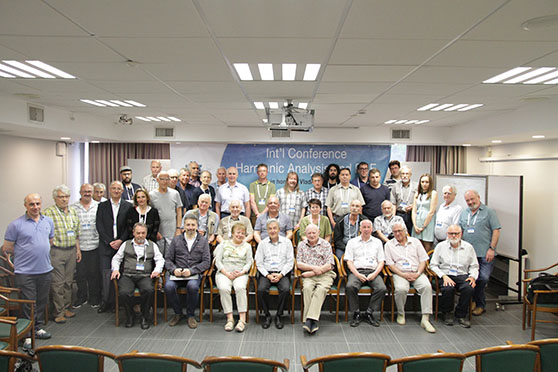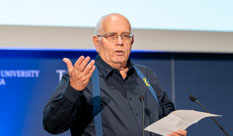More:
News & Stories
Harmonic Analysis and PDE 2019 Conference Program: Thursday, May 30

The Harmonic Analysis conference participants
Photo: Tal Avigad
Todays lectures:
|
09:30-10:15 |
Victor Burenkov Interpolation theory and local Morrey-type spaces |
| 10:20-11:05 |
Matania Ben-Artzi Hebrew University of Jerusalem, Israel
From crystals to Dirac operators-spectral theory
Abstract: We consider constant coefficient first–order partial differential systems, homogeneous and non–homogeneous, and their potential perturbations. It is assumed that the homogeneous part is strongly propagative. In the nonhomegeneous case it is assumed that the operator is isotropic . The spectral theory of such systems and their potential perturbations is expounded, and a Limiting Absorption Principle is obtained up to thresholds. Special attention is given to a detailed study of the Dirac (massive and massless) and Maxwell operators. The estimates of the spectral derivative near the thresholds are based on trace estimates on the slowness surfaces. Two applications of these estimates are presented: 1) Global spacetime estimates of the associated evolution unitary groups, that are also commonly viewed as decay estimates. While analogous estimates exist for the Dirac operator, our decay estimates for the Maxwell system are completely new. 2) The finiteness of the eigenvalues (in the spectral gap) of the perturbed Dirac operator is studied, under suitable decay assumptions on the potential perturbation. This is a joint work with T. Umeda.
|
| ** Coffee break ** | |
|
11:35-12:10 |
Alex Iosevich University of Rochester, USA
The role of curvature in frame theory
Abstract: We are going to discuss the question of the existence of Fourier bases and frames in a variety of Hilbert spaces. We are going to exhibit a class of measures where the corresponding Hilbert space does not possess a frame of exponentials. We are going to discuss the connection between this problem and a variety of questions in geometric measure there.
|
|
12:15-12:45 |
Jacob (Koby) Rubinstein Technion - Israel Institute of Technology, Israel Optimal transport and geometric optics
The classical Fermat principle of least time forms the foundation of geometric optics. We introduce a new principle, that we call the Weighted Least Action Principle, that generalizes the Fermat principle, and moreover deals with measurable quantities. We then show that the new principle is equivalent to the Monge optimal transport problem for a specific cost function. Moreover, we argue that all critical points of the Monge functional are optically relevant. The theoretical analysis is accompanied with experimental results that demonstrate its applicability. Joint work with Gershon Wolansky.
|
| ** Lunch ** | |
|
14:00-14:30 |
Lucian Beznea Simion Stoilow Institute of Mathematics of the Romanian Academy and University of Bucharest, Romania Connections between the Dirichlet and the Neumann problem for integrable boundary data |
| 14:35-15:05 |
Lavi Karp ORT Braude College, Israel The continuity of the flow map for quasilinear symmetric Hyperbolic systems |
| 15:10-15:40 |
Ron Peled Tel Aviv University, Israel Existence of combinatorial structures via asymptotics of integrals
|
| ** Coffee break ** | |
|
16:05-16:35 |
Darya Apushkinskaya Peoples' Friendship University of Russia, Russia and Saarland University, Germany Free boundaries in problems with hysteresis |
| 16:40-17:10 |
Samuel L. Krushkal Bar-Ilan University, Israel A general coefficient theorem for univalent functions |
| 17:15-17:45 |
Gershon Kresin Ariel University, Israel |
| 17:50-18:20 |
Akram Begmatov Samarkand State University, Uzbekistan |
Visit the conference's website >>
- News & Events
New Collaboration with Sheba Medical Center will qualify nurses to work in a digital environment.
Collaboration between HIT Holon Institute of Technology, the teaching authority of the Sheba Medical Center, and the Sheba-BEYOND virtual hospital will allow training nurses in Israel and around the world to work in a digital...



 Additional programs
Additional programs
